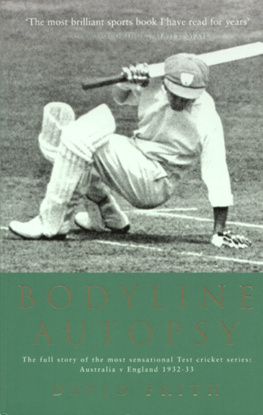
Alastair Cook
THE AUTOBIOGRAPHY
with Michael Calvin

Contents
About the Author
Alastair Nathan Cook was born in Gloucester, December 1984. He is an English cricketer. He plays for Essex County Cricket Club and previously for England. Cook is the fifth highest Test scorer of all time.
He is regarded as Englands most successful batsman ever and now he is an icon and role model in sport.
Outside of cricket, Alastair has written columns in the Telegraph and Metro, he is a talented saxophone player and donates his time to raising money for cancer charities and the David Randall Foundation. He is now married with three children.
For Elsie, Isobel and Jack
Picture Credits
Pictures courtesy of Alastair Cook
. Adam Davy/PA Archive/PA Images
. Adam Davy/PA Archive/PA Images
. Mike Hewitt/Getty Images
. Hamish Blair/Getty Images
. Jordan Mansfield/Getty Images
. Laurence Griffiths/Getty Images
. Scott Heavey/Getty Images
. Mike Egerton/EMPICS Sport/PA
. ADRIAN DENNIS/AFP/Getty Images
. Gareth Copley/Getty Images
. Tom Shaw/Getty Images
. Popperfoto/Getty Images
. Gareth Copley/Getty Images
. Gareth Copley/Getty Images
. Michael Steele/Getty Images
. Michael Dodge/Getty Images
. Gareth Copley/Getty Images
. Gareth Fuller/PA Wire/PA Images
. Dominic Lipinski/PA Wire/PA Images

1. Digging to the Well
Im sorry, lads. I cant believe I just got out like that.
Joe Root, waiting on the glass-fronted balcony of the dressing room at the Oval, smiled, slapped me lightly on the back and told me to shut up. He probably had a point, since the old ground hummed with excitement and commentators were suggesting I was some sort of national treasure, but batting is a serious business.
Joe followed me through a second doorway into an inner changing area, where I took twelve paces to my double peg close to the far right-hand corner. Life went on; the rhythm of professional sport is set by personal priorities, and Jos Buttler, surprised by the sudden fall of wickets, bustled in to complete his preparatory rituals.
After a brief flurry of congratulation, I was left to myself. I sat there for three or four minutes with my pads still on, savouring the silence and sifting through my senses. I looked around, through the organized chaos of discarded kit, lotions and potions. I was in a special, sacred place, where harsh truths are occasionally shared, yet balanced by the intimacy of individuals involved in something bigger than themselves.
The dressing room is a sanctuary, safe from the second guessing of social media and the exaggerated attention of the outside world. It is unique, precious. Each team is different, a collection of distinctive personalities, but this is the only place in which it can truly be itself. I loved that feeling of solidarity, freedom and friendship; thats why, as captain, I encouraged players to linger over a beer at the end of play.
Disappointment, even one as strictly relative as being dismissed carelessly for 147 in my final Test innings, has certain formalities. Ive never been a bat-thrower, a blame-shifter or excuse-seeker. I prefer quick and quiet rationalization; my instinctive apology might have been a bit cloth-eared, but losing two wickets, especially those of well-set batsmen, to successive deliveries is a cardinal sin.
In time, it will be a killer pub-quiz question: name the Indian Test debutant who dismissed two England captains in two balls. Hanuma Vihari is an occasional right-handed off-spinner, a dispenser of what old pros refer to as filth. Theres no disrespect implied, intended or taken in that, by the way. It is merely our form of industrial language.
Rooty had holed out to midwicket for 125. In a world of fine margins, my mind wasnt locked in to the next ball. It was dragged down and I got a little greedy. Instead of making the slightly easier shot, in front of square, I acted on the momentary mental image of a thin gap between two fielders behind the wicket.
I wasnt consciously thinking of the boundary that would have taken me past 150, but I lacked that critical edge of concentration. I smiled and sagged forward, leaning on my bat momentarily, because I couldnt believe I had edged it to the wicketkeeper. All that was left was that final walk to the pavilion, bat aloft and brain whirring.
I noticed the dressing-room TV was replaying those scenes as I sat there, decompressing. The screen showed Alice, my wife, cradling our daughter Elsie and telling her theres Daddy. I didnt cry, despite the temptation; the closest I came to doing so was during that amazing extended ovation for my second-innings century. There wasnt an ounce of me that wanted to carry on. I was done.
The only time in my career I wept uncontrollably was in the dressing room at the MCG during the Boxing Day Ashes Test in 2017. I was 104 not out at the close of play on the second day, on my way to carrying my bat for 244, and couldnt stop myself. I was as puzzled as anyone; on reflection, it was a moment of release after sustained private questioning of my mood and motives.
Retirement is not a snap decision, because representing your country is the greatest of an athletes privileges. It rattles around the brain for months, sometimes years, and ambushes you when you least expect it to. For me the process began at Edgbaston in August 2017, during the first Test against the West Indies, when Rooty joined me at the crease. We were 392 and facing an all too familiar obligation to build a score.
I might have looked calm and dispassionate to the casual spectator, but I felt an enormous weight of expectation, an insidious surge of pressure. That inner voice, a cold, caustic commentator on my faults and weaknesses, piled in on cue: Here we go again, it said. Why are you putting yourself through this mental torture? Youve got nothing else to prove.
I went on to score 243. Joe made 136 and we won by an innings inside three days. But a pebble had been dislodged; an internal conversation with an inevitable conclusion was underway. This wasnt about anything as selfish as personal achievement; it was a private progression of truth and reconciliation. I had to be true to myself, and my teammates.
A player dealing with personal turmoil needs a coach who empathizes with his dilemma. Mark Ramprakash, Englands batting coach, was the first person I turned to, as we walked back from a net session before our second warm-up match of that winters Ashes tour, a daynighter against a Cricket Australia XI at the Adelaide Oval.
Ramps was, by common consent, the most technically accomplished batsman of his generation. He was a driven character, an accumulator of 114 centuries, who retired with a first-class average of 53.14 a couple of months before his forty-third birthday. He fought against the dying of the light but understood where I was coming from.
I dont know why Im doing this any more, I confessed. How many times do I have to dig to the well before there is nothing left? Thats a horrible phrase, a reflection of declining hope and increasing desperation. I was only thirty-two, theoretically years away from unarrestable decline, yet mental decay had set in.
Next page














